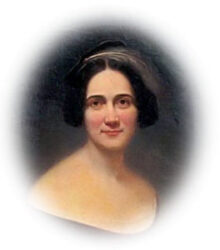June 13th.–Decca’s wedding. It took place last year. We were all lying on the bed or sofas taking it coolly as to undress. Mrs. Singleton had the floor. They were engaged before they went up to Charlottesville; Alexander was on Gregg’s staff, and Gregg was not hard on him; Decca was the worst in love girl she ever saw. “Letters came while we were at the hospital, from Alex, urging her to let him marry her at once. In war times human events, life especially, are very uncertain.
“For several days consecutively she cried without ceasing, and then she consented. The rooms at the hospital were all crowded. Decca and I slept together in the same room. It was arranged by letter that the marriage should take place; a luncheon at her grandfather Minor’s, and then she was to depart with Alex for a few days at Richmond. That was to be their brief slice of honeymoon.
“The day came. The wedding-breakfast was ready, so was the bride in all her bridal array; but no Alex, no bridegroom. Alas! such is the uncertainty of a soldier’s life. The bride said nothing, but she wept like a water-nymph. At dinner she plucked up heart, and at my earnest request was about to join us. And then the cry, ‘ The bridegroom cometh.’ He brought his best man and other friends. We had a jolly dinner. ‘Circumstances over which he had no control’ had kept him away.
“His father sat next to Decca and talked to her all the time as if she had been already married. It was a piece of absent-mindedness on his part, pure and simple, but it was very trying, and the girl had had much to stand that morning, you can well understand. Immediately after dinner the belated bridegroom proposed a walk; so they went for a brief stroll up the mountain. Decca, upon her return, said to me: ‘Send for Robert Barnwell. I mean to be married to-day.’
“‘Impossible. No spare room in the house. No getting away from here; the trains all gone. Don’t you know this hospital place is crammed to the ceiling?’ ‘Alex says I promised to marry him to-day. It is not his fault; he could not come before.’ I shook my head. ‘I don’t care,’ said the positive little thing, ‘I promised Alex to marry him to-day and I will. Send for the Rev. Robert Barnwell.’ We found Robert after a world of trouble, and the bride, lovely in Swiss muslin, was married.
“Then I proposed they should take another walk, and I went to one of my sister nurses and begged her to take me in for the night, as I wished to resign my room to the young couple. At daylight next day they took the train for Richmond.” Such is the small allowance of honeymoon permitted in war time.
Beauregard’s telegram: he can not leave the army of the West. His health is bad. No doubt the sea breezes would restore him, but–he can not come now. Such a lovely name–Gustave Tautant Beauregard. But Jackson and Johnston and Smith and Jones will do–and Lee, how short and sweet.
“Every day,” says Mem, “they come here in shoals– men to say we can not hold Richmond, and we can not hold Charleston much longer. Wretches, beasts! Why do you come here? Why don’t you stay there and fight? Don’t you see that you own yourselves cowards by coming away in the very face of a battle ? If you are not liars as to the danger, you are cowards to run away from it.” Thus roars the practical Mem, growing more furious at each word. These Jeremiahs laugh. They think she means others, not the present company.
Tom Huger resigned his place in the United States Navy and came to us. The Iroquois was his ship in the old navy. They say, as he stood in the rigging, after he was shot in the leg, when his ship was leading the attack upon the Iroquois, his old crew in the Iroquois cheered him, and when his body was borne in, the Federals took off their caps in respect for his gallant conduct. When he was dying, Meta Huger said to him: “An officer wants to see you: he is one of the enemy.” “Let him come in; I have no enemies now.” But when he heard the man’s name:
“No, no. I do not want to see a Southern man who is now in Lincoln’s navy.” The officers of the United States Navy attended his funeral.
